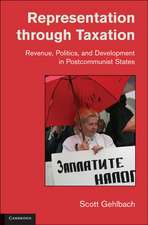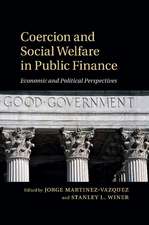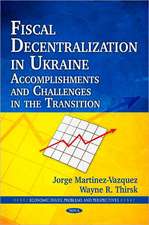Developing Alternative Frameworks for Explaining Tax Compliance: Routledge International Studies in Money and Banking
Editat de James Alm, Jorge Martinez-Vazquez, Benno Torgleren Limba Engleză Paperback – 11 noi 2013
It is the insights of behavioural economics that provide much of the bases for these essays and the main theme running through this book is that the basic model of individual choice must be expanded, by introducing some aspects of behaviour or motivation considered explicitly by other social sciences.
| Toate formatele și edițiile | Preț | Express |
|---|---|---|
| Paperback (1) | 417.20 lei 6-8 săpt. | |
| Taylor & Francis – 11 noi 2013 | 417.20 lei 6-8 săpt. | |
| Hardback (1) | 1228.43 lei 6-8 săpt. | |
| Taylor & Francis – 12 mai 2010 | 1228.43 lei 6-8 săpt. |
Din seria Routledge International Studies in Money and Banking
-
 Preț: 325.16 lei
Preț: 325.16 lei -
 Preț: 313.60 lei
Preț: 313.60 lei -
 Preț: 284.40 lei
Preț: 284.40 lei -
 Preț: 341.55 lei
Preț: 341.55 lei -
 Preț: 311.41 lei
Preț: 311.41 lei -
 Preț: 309.94 lei
Preț: 309.94 lei -
 Preț: 307.47 lei
Preț: 307.47 lei -
 Preț: 313.17 lei
Preț: 313.17 lei - 9%
 Preț: 864.83 lei
Preț: 864.83 lei -
 Preț: 664.76 lei
Preț: 664.76 lei - 18%
 Preț: 1056.00 lei
Preț: 1056.00 lei - 18%
 Preț: 1175.01 lei
Preț: 1175.01 lei - 18%
 Preț: 1122.64 lei
Preț: 1122.64 lei - 24%
 Preț: 148.98 lei
Preț: 148.98 lei - 18%
 Preț: 1067.14 lei
Preț: 1067.14 lei - 25%
 Preț: 503.80 lei
Preț: 503.80 lei - 18%
 Preț: 1058.79 lei
Preț: 1058.79 lei - 26%
 Preț: 820.40 lei
Preț: 820.40 lei - 18%
 Preț: 1058.79 lei
Preț: 1058.79 lei - 28%
 Preț: 821.46 lei
Preț: 821.46 lei - 18%
 Preț: 1057.40 lei
Preț: 1057.40 lei - 26%
 Preț: 765.01 lei
Preț: 765.01 lei - 18%
 Preț: 1056.28 lei
Preț: 1056.28 lei - 15%
 Preț: 254.03 lei
Preț: 254.03 lei - 18%
 Preț: 1064.70 lei
Preț: 1064.70 lei - 18%
 Preț: 1056.00 lei
Preț: 1056.00 lei - 18%
 Preț: 1113.25 lei
Preț: 1113.25 lei - 18%
 Preț: 702.31 lei
Preț: 702.31 lei - 18%
 Preț: 1166.68 lei
Preț: 1166.68 lei - 26%
 Preț: 849.37 lei
Preț: 849.37 lei - 18%
 Preț: 1116.38 lei
Preț: 1116.38 lei - 25%
 Preț: 851.99 lei
Preț: 851.99 lei - 18%
 Preț: 1060.87 lei
Preț: 1060.87 lei - 25%
 Preț: 823.57 lei
Preț: 823.57 lei - 18%
 Preț: 1114.70 lei
Preț: 1114.70 lei - 25%
 Preț: 824.53 lei
Preț: 824.53 lei - 29%
 Preț: 1188.26 lei
Preț: 1188.26 lei - 25%
 Preț: 853.07 lei
Preț: 853.07 lei - 18%
 Preț: 1114.30 lei
Preț: 1114.30 lei -
 Preț: 418.22 lei
Preț: 418.22 lei - 30%
 Preț: 854.10 lei
Preț: 854.10 lei - 18%
 Preț: 1060.25 lei
Preț: 1060.25 lei - 18%
 Preț: 1165.73 lei
Preț: 1165.73 lei - 30%
 Preț: 851.82 lei
Preț: 851.82 lei - 18%
 Preț: 1059.48 lei
Preț: 1059.48 lei - 18%
 Preț: 1240.95 lei
Preț: 1240.95 lei - 26%
 Preț: 1187.46 lei
Preț: 1187.46 lei - 18%
 Preț: 1341.98 lei
Preț: 1341.98 lei - 15%
 Preț: 698.43 lei
Preț: 698.43 lei
Preț: 417.20 lei
Nou
Puncte Express: 626
Preț estimativ în valută:
79.83€ • 83.57$ • 66.05£
79.83€ • 83.57$ • 66.05£
Carte tipărită la comandă
Livrare economică 05-19 aprilie
Preluare comenzi: 021 569.72.76
Specificații
ISBN-13: 9780415750035
ISBN-10: 0415750032
Pagini: 318
Ilustrații: 15
Dimensiuni: 156 x 234 x 23 mm
Greutate: 0.48 kg
Ediția:1
Editura: Taylor & Francis
Colecția Routledge
Seria Routledge International Studies in Money and Banking
Locul publicării:Oxford, United Kingdom
ISBN-10: 0415750032
Pagini: 318
Ilustrații: 15
Dimensiuni: 156 x 234 x 23 mm
Greutate: 0.48 kg
Ediția:1
Editura: Taylor & Francis
Colecția Routledge
Seria Routledge International Studies in Money and Banking
Locul publicării:Oxford, United Kingdom
Public țintă
Postgraduate and UndergraduateCuprins
Part 1: Introduction to the Volume 1. Developing Alternative Frameworks for Explaining Tax Compliance James Alm, Jorge Martinez-Vazquez, and Benno Torgler Part 2: A Review and a Critique of the Existing Literature 2. Why Pay Taxes? A Review of Tax Compliance Decisions Erich Kirchler, Stephan Muehlbacher, Barbara Kastlunger, and Ingrid Wahl Part 3: Expanding the Standard Theory of Compliance 3. Tax Compliance: Social Norms, Culture and Endogeneity John Cullis, Philip Jones, and Alan Lewis 4. Vertical and Horizontal Reciprocity in a Theory of Taxpayer Compliance Jan Schnellenbach 5. Tax Evasion and the Psychological Tax Contract Lars P. Feld and Bruno S. Frey Part 4: Empirical Evidence on Financial Incentives 6. A Meta-Analysis of Incentive Effects in Tax Compliance Experiments Calvin Blackwell 7. Econometric Models for Multi-Stage Audit Processes: An Application to the IRS National Research Program Brian Erard and Jonathan S. Feinstein Part 5: Empirical Evidence on Governance 8. Tax Compliance, Tax Morale and Governance Quality Benno Torgler, Markus Schaffner, and Alison Macintyre 9. Tax Evasion, Corruption , and the Social Contract in Transition Eric Uslaner 10. Procedural Justice and the Regulation of Tax Compliance Behavior: The Moderating Role of Personal Norms Kristina Murphy Part 6: Case Studies 11. Tax Non-Compliance Among the Under-30s: Knowledge, Obligation or Skepticism? Valerie Braithwaite, Monika Reinhart, and Michael Smart 12. The Economic Psychology of Value Added Tax Compliance Paul Webley and Julie Ashby 13. Tax Evasion, the Informal Sector, and Tax Morale in LAC Countries James Alm and Jorge Martinez-Vazquez
Notă biografică
James Alm is Professor of Economics at Georgia State University.
Jorge Martinez-Vazquez is Professor of Economics at Georgia State University.
Benno Torgler is Professor of Economics at Queensland University of Technology.
Jorge Martinez-Vazquez is Professor of Economics at Georgia State University.
Benno Torgler is Professor of Economics at Queensland University of Technology.
Descriere
The essays in this book summarize the existing state of knowledge of tax compliance and tax evasion, present new thinking about this issue, and analyze the empirical relevance of these new perspectives utilizing insights from behavioural economics.



















